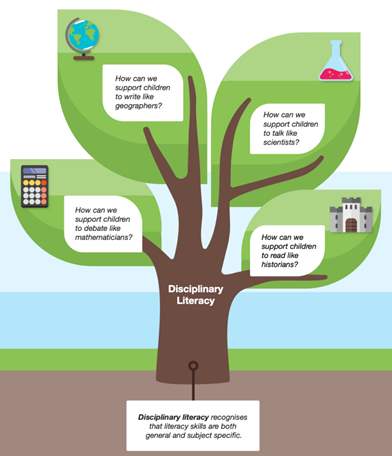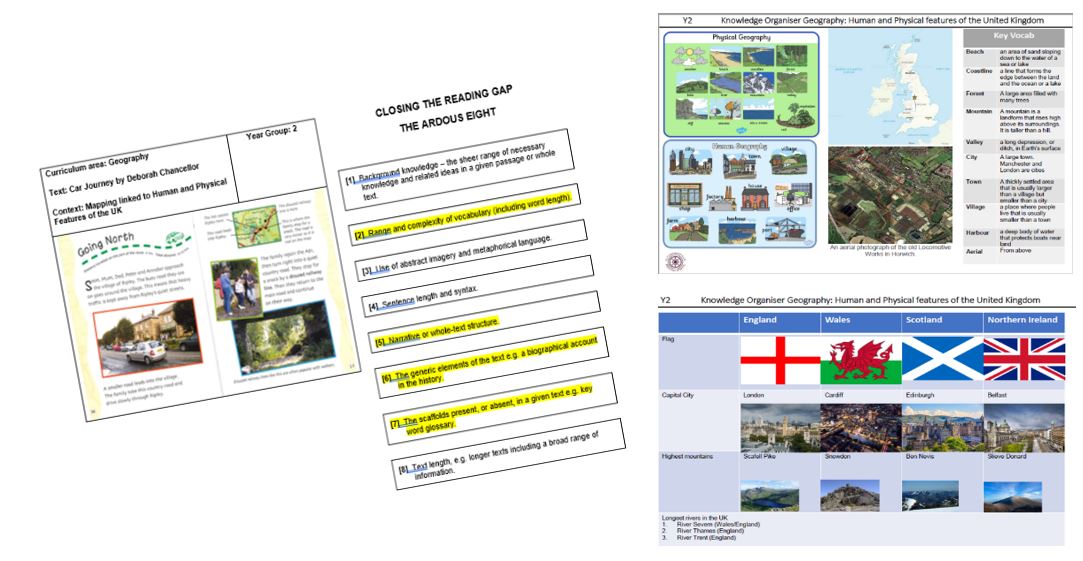Disciplinary Literacy
The EEF states that, “Disciplinary literacy is an approach to improving literacy across the curriculum. It recognises that literacy skills are both general and subject specific, emphasising the value of supporting teachers in every subject to teach students how to read, write and communicate effectively in their subjects.”
EEF – Improving Literacy in Secondary Schools
It is important to be clear that disciplinary literacy is not simply reading in other areas of the curriculum – it is the explicit teaching of how to read in each of these areas. The following blog gives clear examples of this: https://bedrocklearning.org/blog/disciplinary-literacy-what-it-is-and-why-its-important/
[expand title=”CLICK HERE to read more“]
By recognising that the skills needed to read as a historian are different to those needed to read as a scientist, children can apply the relevant skills within the context of a specific field and become competent and successful learners.
This is a skill that will be developed throughout secondary school and the EEF refers to disciplinary literacy in their Improving Literacy in Secondary Schools Guidance Report; however, laying the foundations for these skills in primary school, will be hugely beneficial to pupils as they make the transition from KS2 to KS3.
We can do this by ensuring pupils are reading quality texts which support their learning in other areas of the curriculum. Primary school literacy needs to be rich and varied, with non-fiction texts embedded within it in a meaningful way to enrich pupils learning at the time and prepare them for KS2 and KS3.
Sometimes, as teachers, we can seek ways to avoid text in the wider curriculum. We know reading can be a barrier for some pupils so we use PowerPoint presentations, videos or allow children to research themselves online in order to present information. All of these approaches have a place in the classroom but we must be conscious to provide opportunities for teaching to also come through quality texts. If pupils are not exposed to learning in this way, how will they ever develop the skills and resilience needed to be successful at it?[/expand]
Introducing Disciplinary Literacy
The next step for us as a team is to develop the use of disciplinary literacy in our schools. Once a non-fiction spine is embedded we intend to follow the following process:
[expand title=”CLICK HERE to read more“]
- Decide on a subject to use as a starting point and model.
- English lead and subject lead work together to agree how disciplinary literacy applies to that subject and where each disciplinary literacy skills matches with the non-fiction spine.
- Trial using these skills when using non-fiction texts from this subject (decide whether this will be for a year group or key stage).
- Work as groups of subject leaders (e.g. a humanities team) alongside the English Lead to agree what disciplinary literacy looks like in each subject.
- Subject leads then map where each disciplinary literacy skill matches with the non-fiction spine for their subject area.
- English/SLT quality assures before introducing.
- Monitor and evaluate as an ongoing process.
When embedded, expand to cover the other subject areas/whole school.[/expand]
Further Reading
EEF Guidance Report: Improving Literacy in Secondary Schools (Recommendation 1, pg 6-10) https://d2tic4wvo1iusb.cloudfront.net/eef-guidance-reports/literacy-ks3-ks4/EEF_KS3_KS4_LITERACY_GUIDANCE.pdf
Disciplinary Literacy: The Basics – Shanahan on Literacy https://www.shanahanonliteracy.com/blog/disciplinary-literacy-the-basics#sthash.CbaCGARs.lEcLR3dY.dpbs
Click on the image below to download the PowerPoint presentation –
Audit
Arduous 8 – NF text document St Catherine’s
Pre-complex texts rationale final
Y1 Mapping KO
Y1 mapping pre-complex text
Y2 Human and physical features of the UK KO
Y2 mapping pre-complex text
Y3 Mapping KO
Y3 mapping pre-complex text
Y4 Geography Climate zones and vegetation belts KO
Y4 mapping pre-complex text
Y5 Mapping KO
Y5 mapping pre-complex text
Y6 Locational knowledge Northern England KO
Y6 mapping pre-complex text










